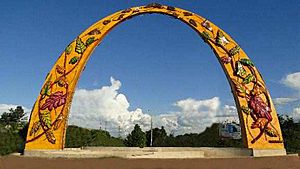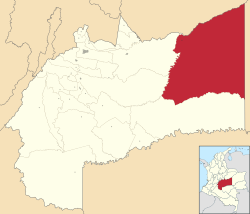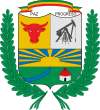Puerto Gaitán facts for kids
Quick facts for kids
Puerto Gaitán
|
|||
|---|---|---|---|
|
Municipality and town
|
|||
 |
|||
|
|||

Location of the municipality and town of Puerto Gaitán in the Meta Department of Colombia.
|
|||
| Country | |||
| Department | Meta Department | ||
| Area | |||
| • Municipality and town | 17,250 km2 (6,660 sq mi) | ||
| • Urban | 2.63 km2 (1.02 sq mi) | ||
| Elevation | 149 m (489 ft) | ||
| Population
(2018 census)
|
|||
| • Municipality and town | 41,513 | ||
| • Density | 2.4066/km2 (6.2329/sq mi) | ||
| • Urban | 20,659 | ||
| • Urban density | 7,855/km2 (20,340/sq mi) | ||
| Time zone | UTC-5 (Colombia Standard Time) | ||
| Climate | Aw | ||
Puerto Gaitán (Spanish pronunciation: [ˈpweɾto ɣajˈtan]) is a town and municipality in the Meta Department, Colombia.
Contents
History
Puerto Gaitán was founded on February 11, 1932, when Venezuelan merchants: Pedro Capella, Ventura Alvarado and Concepción Izanoboco arrived on the banks of the Manacacías River and settled there before the announcement of the provision of a ferry or ferryboat from the Manacacías River to achieve transit between Puerto Carreño and Villavicencio.
In this first point there was quite a lot of “majaguillo” tree, which gave it the name of majaguillal, until 1960 when it was elevated to the category of Police Inspection of the municipality of Puerto López and was called Manacacías.
On November 29, 1969, the Departmental Assembly of Meta erected this population as a municipality with the name of Puerto Gaitán, in honor of the liberal leader Jorge Eliécer Gaitán.
Geography
Location
Pto Gaitan is a municipality located in the department of Meta. It includes an extensive area of flat structure known as the Savannahs of the Altillanura, whose main articulating axis is the Meta River.
The Municipality is an irregular rectangle circumscribed by the Meta River to the north, the Manacacias River and the Yucao River to the west, the Iteviare River to the south and a straight line to the East. It forms the extreme north-east of the Department of Meta, being the most distant Municipality from the departmental capital city Villavicencio.
Hydrography
Rivers Manacacias, Meta, Yucao, Planas, Muco, Guarrojo, Tillaba, and Uva.
Climate
In Puerto Gaitán, the summers are short, warm, and cloudy; the winters are hot, wet, and mostly cloudy; and it is oppressive year round. During the course of the year, the temperature generally ranges from 22 °C to 34 °C, rarely falling below 20 °C or rising above 37 °C.
Based on the beach/pool score, the best times of year to visit Puerto Gaitán for hot activities are mid June to mid October and early December to early February.
| Climate data for Puerto Gaitán (Carimagua), elevation 200 m (660 ft), (1971–2000) | |||||||||||||
|---|---|---|---|---|---|---|---|---|---|---|---|---|---|
| Month | Jan | Feb | Mar | Apr | May | Jun | Jul | Aug | Sep | Oct | Nov | Dec | Year |
| Mean daily maximum °C (°F) | 32.5 (90.5) |
33.9 (93.0) |
33.6 (92.5) |
31.9 (89.4) |
30.7 (87.3) |
29.5 (85.1) |
29.4 (84.9) |
30.1 (86.2) |
30.7 (87.3) |
31.2 (88.2) |
31.1 (88.0) |
31.3 (88.3) |
31.3 (88.3) |
| Daily mean °C (°F) | 27.0 (80.6) |
27.8 (82.0) |
27.9 (82.2) |
26.5 (79.7) |
25.5 (77.9) |
24.8 (76.6) |
24.6 (76.3) |
24.9 (76.8) |
25.5 (77.9) |
25.9 (78.6) |
26.4 (79.5) |
26.5 (79.7) |
26.1 (79.0) |
| Mean daily minimum °C (°F) | 21.6 (70.9) |
22.2 (72.0) |
22.8 (73.0) |
22.8 (73.0) |
22.3 (72.1) |
22.1 (71.8) |
21.6 (70.9) |
21.7 (71.1) |
21.9 (71.4) |
22.3 (72.1) |
22.5 (72.5) |
22.0 (71.6) |
22.1 (71.8) |
| Average precipitation mm (inches) | 13.9 (0.55) |
45.6 (1.80) |
93.2 (3.67) |
244.5 (9.63) |
320.8 (12.63) |
397.5 (15.65) |
328.0 (12.91) |
255.2 (10.05) |
276.1 (10.87) |
245.1 (9.65) |
137.3 (5.41) |
50.5 (1.99) |
2,407.7 (94.79) |
| Average precipitation days | 3 | 4 | 8 | 17 | 22 | 23 | 23 | 21 | 19 | 17 | 11 | 5 | 172 |
| Average relative humidity (%) | 71 | 68 | 72 | 81 | 86 | 88 | 87 | 86 | 85 | 83 | 81 | 77 | 80 |
| Mean monthly sunshine hours | 257.3 | 206.3 | 173.6 | 135.0 | 130.2 | 117.0 | 127.1 | 142.6 | 153.0 | 173.6 | 192.0 | 235.6 | 2,043.3 |
| Mean daily sunshine hours | 8.3 | 7.3 | 5.6 | 4.5 | 4.2 | 3.9 | 4.1 | 4.6 | 5.1 | 5.6 | 6.4 | 7.6 | 5.6 |
| Source: Instituto de Hidrologia Meteorologia y Estudios Ambientales | |||||||||||||
Economy
The economic activities of the municipality are basically subscribed to livestock, medium-scale agriculture, trade and fishing is incipient and artisanal industry as well. Livestock occupies the first line in the Municipality in the economic sector. In Agriculture, corn, banana, cassava and African palm crops stand out. The practice of fishing also represents a very good source of income and in tourism.
The Rubiales oil field is the largest generator of resources for this Municipality, being approximately 90% of the annual budget, but it is a non-renewable resource.
Infrastructure and urban equipment
See also
 In Spanish: Puerto Gaitán para niños
In Spanish: Puerto Gaitán para niños



